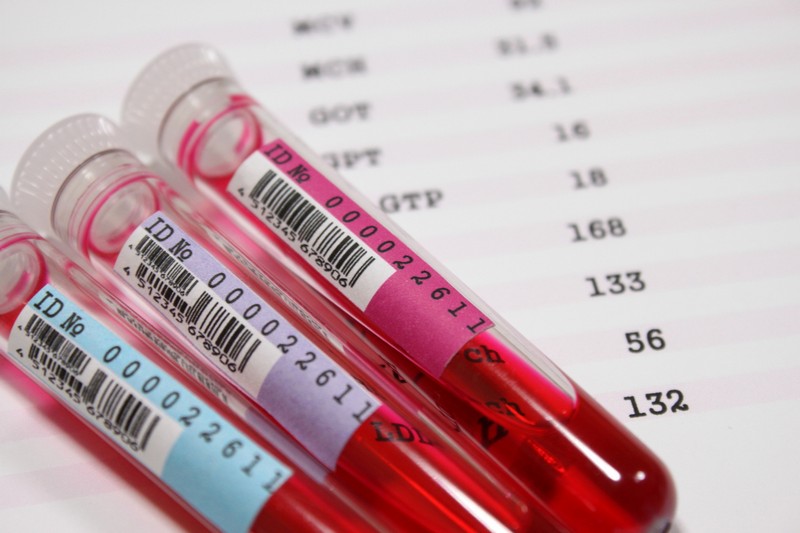A blood test for female hormones will detect signs of a malfunction in the hormonal system. What is considered an indication for research in women and how to properly prepare for blood tests for female sex hormones?
In today's world, doctors have to watch the increase in the number of diseases that are directly related to the dysfunction of the endocrine system. Such unacceptable dynamics is facilitated by poor environmental conditions, food and hereditary factors.
Violations of the function of the endocrine system in women provoke the development of diseases of a gynecological nature and the reproductive system. It is possible to diagnose possible imbalances of hormones in a timely manner by passing appropriate tests, which will allow you to proceed with adequate treatment.
Female hormones are highly responsible for the proper function of the reproductive system. The attending physician may suspect an endocrine dysfunction if fertilization does not occur within 6 months. But only on condition that the young couple regularly engages in sexual activity. It is recommended to donate blood for the amount of hormones, which will exclude or confirm the diagnosis of a woman's infertility.
The endocrine system controls the work of all organs. Her glands are located in different parts of the body, but are functionally interconnected. Based on this, we can confidently say that, for example, in case of infertility, only the ovaries cannot be blamed. The most common causes of endocrine dysfunction in women are:
Signs of hormonal failure can be spontaneous miscarriages, ovarian diseases and disruptions in the menstrual cycle.
Also, a woman should pay attention to her diet - it should be balanced and rational. In the case when, with proper nutrition and a normal lifestyle, unreasonable weight gain occurs, this can serve as a signal that a hormonal imbalance occurs in the body. All this is the basis for a visit to the endocrinologist, and undergo a full examination.
Preparing for a blood test
Hormonal blood test is carried out strictly on certain days of the cycle. Therefore, it is extremely important not only to properly prepare for such a procedure, but also to accurately determine the days of its implementation. The decoding of the analyzes will show the most accurate results only if all the requirements are met.
The procedure for donating blood for hormones must be approached with full responsibility and follow all the basic rules of preparation. First of all, you need to limit the woman from possible stresses as much as possible. Physical activity is also a contraindication.
In addition, a woman must:
- 2-3 days before the procedure, completely exclude the consumption of fatty foods,
- For a day, give up sexual relations, cigarettes and even low-alcohol drinks,
- Mineral still water is the only product that a woman is allowed to consume in the last 12 hours before the procedure.
The woman's body is unique. A new life is born in it, the birth of which the whole family rejoices. Female hormones are mainly responsible for the smooth functioning of the reproductive system. The slightest suspicion of a possible deviation requires a careful examination by a gynecologist-endocrinologist, who individually selects the day of the procedure.
Analysis during pregnancy
During pregnancy, hormonal changes occur and this is not a secret for anyone. Therefore, when registering, a pregnant woman must undergo a complete examination, but the doctor prescribes a blood test for hormones only in certain situations.
Blood tests for female hormones are carefully studied, and will determine the level of important substances:
- Progesterone is a hormone, the normal level of which will allow a woman to safely bear a fetus. The analysis is carried out at the end of the second trimester of pregnancy. Based on the results obtained, it is possible to determine the correct production of progesterone by the placenta. In addition, the delivery of the analysis is recommended if there is a suspicion of overbearing the fetus;
- Alpha-fetoprotein is responsible for the proper development of the fetus. Its production is carried out directly by the fetus. Deviation from the norm gives the prerequisites to believe the presence of pathological development;
- Estradiol and estriol are responsible for the proper course of pregnancy. Deficiency of these hormones signals an increased risk of spontaneous miscarriage.
If, after passing the tests, the doctor determines the hormonal deviations of any, then a second study is prescribed, which will help eliminate the possibility of an error. Proper diagnosis allows doctors to conduct the correct treatment in a timely manner and prevent the development of the problem.

Hormonal disorders during menopause
The slow extinction of the main function of the ovaries leads to menopause. Normally, menopause occurs by the age of 45-50. But at this age, the absence of menstruation does not necessarily indicate the onset of menopause. It is impossible to exclude pathological changes in the endocrine system and genital organs, as well as the onset of pregnancy.
You can accurately determine the cause of the absence of menstruation based on the results of the tests.
The results of the analysis for hormones in menopause will allow the doctor to choose the right treatment therapy, the choice of which depends on the quantitative composition of substances in the blood of each individual woman. The doctor orders a blood test to determine the amount of:
- estradiol,
The first symptom of menopause is the absence or failure of menstruation. In addition, the onset of menopause may be indicated by hot flashes in the chest and head. They come on suddenly and unpredictably.
In a calm environment, the woman begins to feel uncomfortable, the body is covered with cold sweat, there is a slight dizziness, tachycardia, weakness and a sharp push of heat. When measuring blood pressure, the readings will be higher than normal. In addition, with the onset of menopause, the emotional state of a woman also changes. She becomes more vulnerable, more often nervous or withdrawn into herself. There have been cases of depression. Explicit prerequisites for menopause can be called dry mucous membranes and skin.
A blood test at the onset of menopause shows a significant decrease in the rate of estradiol - 6-82 pg / ml. which is significantly lower than its amount in the reproductive period of a woman. This is considered a strong reason to believe that a period of ovarian failure begins in a woman's life. The amount of estradiol in the blood is influenced by several factors:
- Antibiotics. Taking medications significantly reduces ovarian function;
- Tobacco products and alcoholic beverages provoke a drop in estradiol, which affects the state of bone tissue, the cardiovascular system, mucous membranes, and increases the number of hot flashes;
- Physical activity. Sports, running, active lifestyle increase the amount of estradiol in the blood.
If during menopause the amount of estradiol is 82 pg / ml, then this causes alertness among doctors and suspicion of the development of gynecological pathologies. A woman constantly feels increased fatigue, there is tissue swelling, pain in the mammary glands, and the digestion process is disturbed. The lower limit of the norm of estradiol can serve as an indicator of the complicated course of menopause.
How to take a blood test
If a woman is suspected of menopause, a blood sample is taken to determine the balance of hormones. Based on the results of the tests, the doctor can accurately determine the diagnosis, confirm the onset of menopause or the development of another disease. Two days before the test, you need to give up drugs and drinking coffee. Also, it is recommended to refrain from sexual intercourse and reduce your physical activity. Blood sampling is carried out in the morning on an empty stomach.
Thanks to the delivery of a blood test, you can accurately determine any violations in the hormonal background. This will allow not only to preserve the health of a woman, but to plan pregnancy correctly, to bear a healthy and strong baby, and to prevent the development of pathological changes in the body.
Summing up, we can list the signs that suggest a failure in the hormonal system:
- sudden weight loss or weight gain
- problems with pregnancy
- miscarriages.
- excessive body hair
- frequent depression,
- underdevelopment of the mammary glands,
- violation of the menstrual cycle,
- increased sweating of the hands and feet,
- acne in adolescence.
The manifestation of one of the above symptoms indicates that a woman should immediately contact a doctor for professional medical help.



